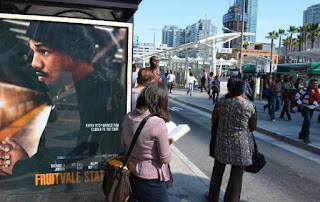Review: Fruitvale Station (2013)
Fruitvale Station is an independent effort that will most likely go unnoticed among the throngs of larger-budget films currently showing. Truth be told, that is somewhat tragic. Sure, the plot centers on a relatively unknown person, but I don’t consider that to be the underlying motor driving the story. The main character, Oscar Grant, is like a million other people in the world. He is a face in the crowd, invisible to most of society – and for that reason, his life is nothing if not insignificant. At least that’s what a warped sense of importance would have us believe.
Oscar (Michael B. Jordan) is a 22-year old with a rough past. Born into relative hardship, his future seems to be mapped out ahead of him. His jobs are fleeting, and illegal activities shine in comparison to working for low wages and keeping a normal schedule. His girlfriend Sophina (Melonie Diaz) and daughter Tatiana (Ariana Neal) are living with a constant fear of instability. They know that Oscar’s intentions are good, but his track record dictates that he will either fail on the straight and narrow or end up in prison for trying to earn money the only way he can. It is the quintessential double-edged sword.
This film follows Oscar around through an ordinary afternoon. It is the last day of 2008 and his mother Wanda’s (Octavia Spencer) birthday; the evening’s plans are to watch New Year’s Eve fireworks in the city. Fearing that Oscar will drink and drive, Wanda suggests he and his friends travel via the BART (Bay Area Rapid Transit) station. It is never mentioned directly, but Wanda’s fear of Oscar behind the wheel seems to be rooted in a previous incident. This is supported by her insistence that he wear an ear piece while driving and talking on his cell phone. As it happens, avoiding the roads and taking the train will prove to be more troublesome than anyone could have imagined.
Fruitvale Station begins with the five words that audiences usually lap up vigorously: based on a true story. Any of us can watch a film and become engrossed, but when we realize that the events before us actually transpired, even if the filmmakers took artistic license, it adds something to the experience. Oscar was not only a real person, but the center of a controversy that still resonates in light of the recent goings on in Sanford, Florida. I cannot elaborate on what happens, but there is something to be said for the cultivation of stereotypes. Despite his shortcomings, Oscar is far from a bad person. He is an attentive father and a genuinely nice guy. His biggest challenge, it seems, is digging himself out from beneath the weighty barriers that come with growing up in a less-fortunate environment. This is not a struggle unique to him; countless children are raised around poverty, drugs, weapons, and fighting. Those children eventually become adults, though age and its supposed wisdom can hardly be expected to supersede the emotional trauma they’ve suffered.
Interestingly enough, Oscar is the kind of person that would ordinarily be feared by, dare I say, a majority of white America. From a distance, he is just another out-of-work strain on the system. The issue is that Oscar’s story is multidimensional, but his upbringing does not afford him a wealth of people interested enough to listen. Whether or not society is aware, such indifference simply creates more of the same. Oscar knows that the odds are against him; try as he might, the road to redemption is much longer because opposition stands in all corners. So what happens? Oscar gives up on the legal way of doing things because it has never gotten him anywhere. And then what happens? Oscar’s choices land him in jail. Next? “Regular society” pats itself on the back for correctly profiling this type of individual, failing to remember that there could be no other logical result in a world where racism is still very much alive. It’s a sad state of affairs, but the unfortunate reality
What Fruitvale Station does is force us to stop looking at Oscar from a distance. It brings us into his life, so that we might understand his choices, even if we don’t necessarily agree with them. In the end, the audience gets a vivid picture of just how futile everything can be. Still, there is a message of hope here. I felt this film was brilliantly acted and the pacing effective considering how much time has supposedly elapsed in Oscar’s day.
For an independent film, I was surprised at how many showings are available. I can only hope that it is getting as much attention everywhere else, so please see it if you can!
